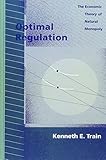Optimal regulation: the economic theory of natural monopoly
Material type: TextPublication details: Cambridge The MIT Press 1991Edition: 1st edDescription: xiv, 338 p. ill. 24 cmISBN: 9780262200844Subject(s): Competition | Economic models | Economic theory | Market forces | Monopolies | Trade regulationDDC classification: 338.82 TRA
TextPublication details: Cambridge The MIT Press 1991Edition: 1st edDescription: xiv, 338 p. ill. 24 cmISBN: 9780262200844Subject(s): Competition | Economic models | Economic theory | Market forces | Monopolies | Trade regulationDDC classification: 338.82 TRA | Item type | Current library | Collection | Call number | Status | Notes | Date due | Barcode |
|---|---|---|---|---|---|---|---|
 Books
Books
|
FMS Library
|
General | 338.82 TRA (Browse shelf(Opens below)) | Available | Includes bibliographical references (p. [329]-333) and index. | M001708 |
Suggested by Prof. Diptiranjan Mahapatra
2 Regulatory Mechanisms to Induce Optimal Outcomes for One-Product Natural Monopolies; Part II : the principles and logic of policy for change : economics and ethics; 3. Policies for dynamic change and transition : lessons from economic history and economic theory; 4. How some economic analyses have distorted the issues; 5. The ethics of intertemporal values and valuations; 6. Broad approaches to moral and political philosophy : converging perspectives; Part III : action around the world : progress, collaboration, equity; 8. Building national and international action; 10. Conclusion : how ideas change over time.
Optimal Regulation addresses the central issue of regulatory economics--how to regulate firms in a way that induces them to produce and price optimally. It synthesizes an extensive literature on what constitutes optimality in various situations and what r


There are no comments on this title.